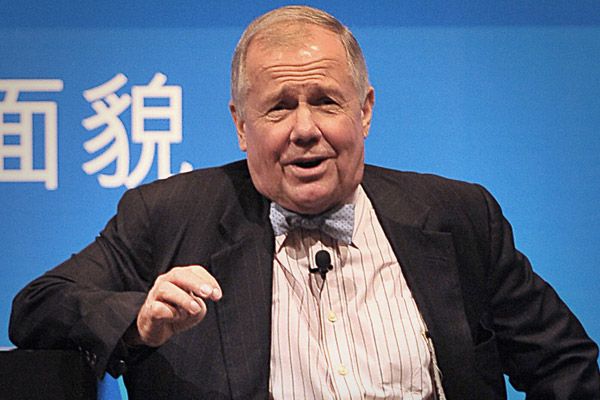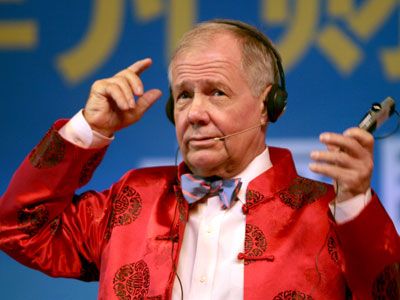I won't say he is a publicity hound, but Rogers just naturally seems to slide into a media role. With his usual bow tie and southern accent (his origins are in Alabama), he's instantly recognizable. With apologies to him, he always puts me in mind of Truman Capote. But Capote wrote a lot better.
Now I'm more glad than not I didn't. Back then materials, agricultural products, and all that were truly "hot." Crooks were breaking into offices and warehouses not to steal money or equipment but to nick copper wire, it fetched such a handsome price. A lot easier than cracking safes, I'd imagine, and what police detective would have the smallest idea how to trace missing copper wire?
Rogers has a new hand to play: he is part of what you might call the "alt-investment" movement, which warns of a coming economic debacle because of irresponsible money printing and the short-sighted ignorance of politicians and Federal Reserve. He belongs to the same club as Peter Schiff, Marc Faber, Gerald Celente, Ron Paul, Max Keiser, and his sometime buddy George Soros.
When I ran across his latest book, Street Smarts, at the library I was interested enough to check it out. Street Smarts is a sort of autobiography laced with financial commentary. Parts of it are fun. He slams the U.S. economic Establishment mercilessly:
Hank Paulson was the secretary of the Treasury when, in 2008, after the subprime crisis hit, all the bankers in New York started ringing his phone off the hook, screaming that the world was coming to an end. ... [President Bush told Paulson], 'Do what you have to do,' ceding responsibility for doing what was best for the country to the man who two years earlier had been the CEO of Goldman Sachs, one of the banks that was on hold back in Paulson's office.I lost my respect for Jim Rogers in chapter 11, "Nations of Immigrants." Rogers has taken motorcycle trips around the world, documented in his books and on public television. He moved with his family to Singapore and has probably traveled to most of the world's countries. So it may be asking too much of him to harbor any quaint patriotic attachments. It would be reasonable, though, to expect him to show some responsibility toward those non-millionaires who, unlike him, must bear the consequences of his zest for open borders.
In eight years as chief executive officer, it was Paulson who had presided over the feeding frenzy in which a ravenous Goldman Sachs had gorged on subprime mortgages, the same junk paper that was now impossible to pawn off and on which his colleagues at the firm were presently choking. ...
Paulson could count on the concurrence of Bernanke, the know-nothing who was instrumental in creating the catastrophe, and that of Timothy Geithner, president of the New York Fed, the institution charged with supervising the banking system that had just gone south, and obviously a man who knew even less than Bernanke. ...Geithner, rewarded for his ineptitude, was named to replace [Paulson] as Treasury secretary, pressed upon the incoming Obama administration by the New York banking community, which appreciated Geithner as the simple, little wimp sitting at the New York Fed who did whatever they asked. He was just the lackey they needed in Washington, the pushover who could be trusted to protect them when they told him the sky was falling.
For Rogers, there can be no rational, principle-based case against allowing the Third World to colonize the United States (or any other country). It's just "intolerance." His description of people who believe other than he does is such a childish caricature that he debases himself in the process:
... Outsiders make for convenient scapegoats. When people are looking for people to blame, they blame the foreigners first. Their language is different, their religion is different, their skin is different, their food is different, their food smells bad -- they smell bad.And:
America's greatest prosperity came before immigration laws were instituted. They were spawned in the 1920s, out of fear and monumental ignorance, at the instigation of the Ku Klux Klan, with a prejudice against all immigrants: Italians, Catholics, Jews, anyone remotely different. Before that our borders were open. As were borders all over the world. Marco Polo did not have a passport. Nor did Christopher Columbus.This is so idiotic it's hardly worth replying to. But for the record, the U.S. was pretty damn prosperous in the late '40s through early '60s, when immigration was at a virtual standstill. The Ku Klux Klan did not rule the country and make its laws. So Marco Polo in the 13th century didn't have a passport -- touché! What a devastating argument for mass colonization by people who have nothing in common with the indigenous people. Christopher Columbus "immigrated" to America so he could settle down, do the jobs Americans wouldn't do (building wigwams, fletching arrows) and send most of his paycheck back to Ferdinand and Isabella in Spain.
Jim Rogers is a homo economicus. Even were he right about the alleged contribution of mass immigration to prosperity (but he isn't), he doesn't know or care about human values, only monetary ones. Count your wealth, Jim. You have your reward.






2 comments:
To quote Mr. Rodgers (whose neighborhood is the very upscale area of city X) ''their food is different, their food smells bad'' struck me as just plain silly. You can go just about anywhere on earth and find different and bad smelling eats.
His writings about the Klan also shows his myopia, much of what they advocated in the political sphere was not ''outside the mainstream'' it was the mainstream, but of course since the 60's they have become a convenient bogyman for anything that is *gasp* 'nativist' even though since then they have become irrelevant.
Does it matter to him if America become Brazil? To him, not at all - there are places there where that are little different than Manhattan in every sense. The Olympic zone in '16 will only be different than the Olympic zone in London was last year in décor.
BTW, I noticed you added Charles Hugh Smith to the 'Money' section of the blogroll.
Excellent choice, been reading oftwominds myself for over two years now. He has a knack for getting right to the point and seeing things from a 'meta' perspective: What does the trend show, and why are things going wrong?
He also brings a 'real world' POV that is often missing from much of financial writing.
rule of thumb: never trust any one in a bow tie.
Post a Comment